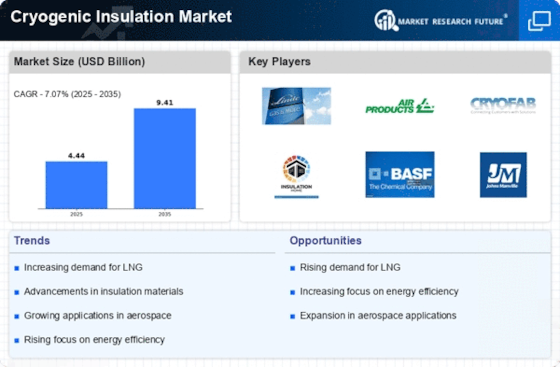Top Industry Leaders in the Cryogenic Insulation Market
 In the realm of extreme temperatures, beyond the reach of everyday ice packs, lies the fascinating world of cryogenic insulation. Here, specialized materials battle against bone-chilling temperatures, safeguarding sensitive equipment and scientific advancements. The global cryogenic insulation market is a competitive battlefield where giants like BASF and Johns Manville vie alongside innovative startups, all striving to conquer the coldest corners of technology. Let's embark on a journey to uncover the strategies driving success, the factors governing market share, and the recent developments pushing the boundaries of cryogenic insulation.
In the realm of extreme temperatures, beyond the reach of everyday ice packs, lies the fascinating world of cryogenic insulation. Here, specialized materials battle against bone-chilling temperatures, safeguarding sensitive equipment and scientific advancements. The global cryogenic insulation market is a competitive battlefield where giants like BASF and Johns Manville vie alongside innovative startups, all striving to conquer the coldest corners of technology. Let's embark on a journey to uncover the strategies driving success, the factors governing market share, and the recent developments pushing the boundaries of cryogenic insulation.
Strategies Chilling the Competition:
-
Material Innovation: Pushing the limits of physics, companies like Aspen Aerogels are pioneering revolutionary materials like silica aerogels and vacuum insulation panels, boasting near-perfect thermal insulation properties. This unlocks access to new applications and caters to more demanding cryogenic needs. -
Customization and Design: Every cryogenic application faces unique thermal challenges. Leading players like Saint-Gobain Isover offer customized insulation solutions, tailoring material properties and configurations to specific equipment and temperature requirements. -
Sustainability Focus: Even in the cryogenic world, sustainability reigns supreme. Companies like Armacell are developing eco-friendly insulation materials made from recycled content or with zero ozone depletion potential, appealing to environmentally conscious customers. -
Technological Integration: Cryogenic insulation is increasingly intertwined with advanced technologies like cryogenic sensors and automated monitoring systems. Companies like Morgan Thermal Ceramics are integrating these technologies into their insulation solutions, enabling real-time performance monitoring and optimized temperature control. -
Strategic Partnerships and Collaborations: Collaboration is key in navigating the complex complexities of cryogenics. Leading players like Owens Corning are partnering with research institutions, equipment manufacturers, and end-user industries to share expertise, accelerate innovation, and develop holistic solutions.
Factors Influencing Market Share:
-
Performance and Efficiency: In the cryogenic realm, efficiency is paramount. Companies with insulation materials offering superior thermal performance, minimal heat leak, and long-term stability gain a competitive edge. -
Application Suitability: Different cryogenic applications have diverse needs. Companies like Vacuum Technology Inc. understand these nuances, catering to specific requirements in sectors like LNG storage, space exploration, and medical research. -
Cost-Effectiveness and Installation Ease: While performance is crucial, cost remains a key consideration. Companies like Johns Manville excel in offering cost-competitive solutions and user-friendly installation processes, making cryogenic insulation more accessible. -
Regulatory Landscape and Safety: Stringent safety regulations govern cryogenic applications. Companies like Cabot Corporation prioritize compliance and invest in developing materials that meet or exceed safety standards, ensuring user trust and market reliability. -
Regional Market Dynamics: Market dynamics vary across regions. North America and Europe currently lead the way, but Asia-Pacific is expected to witness significant growth driven by infrastructure development and scientific advancements.
Key Companies in the cryogenic insulation market include
Aspen Aerogels (US)
KAEFER (Germany)
Aspen Aerogels (US)
BASF SE (Germany)
Armacell Enterprise GmbH & Co. KG (Germany)
Lydall Inc (US)
Cabot Corporation (US)
DUNMORE (US)
Owens Corning (US)
Röchling (France)
Recent Developments:
-
August 2023: Aspen Aerogels announces a new collaboration with a leading space exploration agency to develop next-generation cryogenic insulation for spacecraft applications. -
September 2023: The International Electrotechnical Commission releases new safety standards for cryogenic equipment and insulation materials, impacting product design and production processes. -
October 2023: Johns Manville unveils a cost-effective, pre-fabricated cryogenic insulation system for LNG storage tanks, aiming to increase accessibility and market penetration. -
November 2023: BASF introduces a bio-based cryogenic insulation material made from renewable resources, showcasing its commitment to sustainability in the cold realm. -
December 2023: Morgan Thermal Ceramics partners with a medical research institute to develop cryogenic insulation solutions for advanced biopreservation of cells and tissues.
News
On December 25th, 2021, Dunmore’s multi-layer insulation films were used to protect the James Webb Space Telescope developed by NASA, the European Space Agency and the Canadian Space Agency. Dunmore produces materials that can withstand thermal radiation and keeps the telescope at 40 Kelvin (-233 degrees Celsius).
In March 2021, Qatar Petroleum signed an MOU with LNT Marine, ABS, and SWS on the development of new medium and large LNG carrier designs with other major international LNG companies.LNT Marine develops LNG carriers and cryogenic insulation systems for marine applications. It is also an LNG market technology provider/developer.
Acme Cryogenics bought Cryogenics Experts, Inc. in February 2019. Acme’s portfolio of cryogenic insulation will be expanded thanks to this acquisition, which is located in Southern California, and it will contribute to the market’s growth during the forecast period.










